Sep 20, 2022 | Non categorizzato
In an atmosphere of joy, peace and fraternity, the 11th General Assembly of the World Council of Churches concluded a few days ago in Karlsruhe, Germany. Following is from the Centro Uno team, Focolare’s international secretariat for ecumenism, who were present at the event. “The love of Christ moves the world to reconciliation and unity.” This was the Christological theme for the 11th General Assembly of the World Council of Churches that took place in Karlsruhe, Germany, from August 31 to September 8. Present were representatives of some 350 churches, WCC member delegates and leaders, leaders of other faith communities cooperating with the Council for the Unity of Humanity, as well as a delegation from both the Ukrainian and Russian churches. It was a strong sign and tangible testimony to how this council is truly a platform perpetually open to dialogue. Participants from all continents brought with them the living image of all humanity, in its diversity, suffering and richness. They told of their stories, their great love for Christ, their struggles for peace, and their desire to aim for unity. It is a project that needs not just any love to be realised, but the love that comes from the heart of the Trinity, found only in contact with God. This was expressed in the special importance and care given to prayer. Each day, in fact, began and ended by praying inside a spacious and bright tent set up in memory of the place of the covenant, where the Jewish people met with Moses. The diversity of liturgies, languages, music, songs and customs fuelled the joy and awe of the richness of one common faith, expressed in an infinite number of ways. The delegations came to Karlsruhe as pilgrims aiming to accompany and support each other, chart new directions and witness together to God’s love. Leading the delegation from the Catholic Church was Cardinal Kurt Koch, who at the opening of the event made a gift of some of Pope Francis’ words written for the occasion, encouraging the participants to grow in fraternal communion in the name of Christ, to be credible as an outgoing church and to comfort the world in a time of division and war. The Focolare’s contribution fit as a piece in this large mosaic, with attendance of more than 30 people, Catholic and from various churches, including bishop friends of the Focolare, focolarini, Gen (the movement’s youth), Volunteers of God and a Muslim friend. Being present together with so many people from the various churches was a unique experience for each of us and a precious opportunity to feel one in the love of Christ. The assembly concluded with deliberating on a report that referred to three significant challenges of our time: climate justice, racial justice, and equality between men and women. It emphasised how the churches can address these and was accepted by a majority vote. These elements not only set us on the path, but as we read in a few lines of the final document, reveal a similarity with the goals and spirit that guides the Focolare Movement. “One can define the search for unity, which is inspired by love and rooted in a deep and reciprical relationship, as an ‘ecumenism of the heart.’ It is Christian love that impels us to walk honestly and wholeheartedly alongside one another, to try to see the world through each other’s eyes and feel compassion for one another.”
Centro Uno
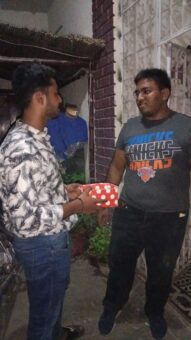
Sep 13, 2022 | Non categorizzato
An exceptional wave of monsoon rains, five times greater than average, has caused one of the most disastrous floods in Pakistan in recent decades. A real catastrophe but one which, despite the enormous difficulties, has not dampened the desire of many people on the ground to take concrete action for their neighbour. A fund-raising campaign has also been launched by the Focolare Movement’s Emergency Coordination Team. What Pakistan is currently experiencing is a real humanitarian and health emergency. The monsoon rains which began as early as mid-June 2022 and are also caused by climate change have brought a third of the country to its knees. Some 33 million people, 15% of the entire population, have been displaced, more than 1,500 people have died and more than 700,000 homes destroyed. The threat of diseases such as typhoid, cholera and dengue fever grows day by day, and the needs are becoming increasingly urgent. 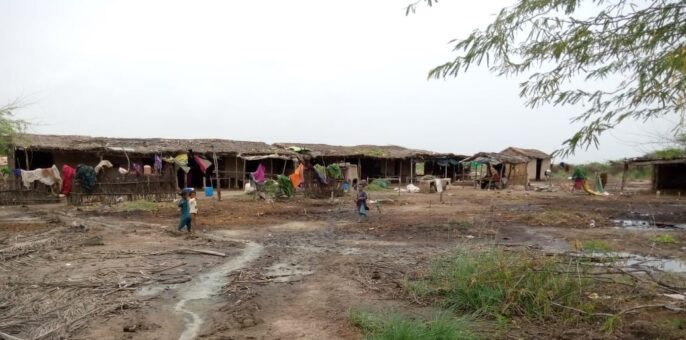 The megalopolis of Karachi, one of the places where the Focolare Movement has been present for some time, has not been hit as hard as other centres such as the provinces of Sindh, southern Punjab and Balucistan which even under normal conditions are already difficult to reach. However, “the displaced people are also coming here and we are mobilising to organise help in the reception camps,” said some members of the Focolare. In addition, many Focolare members of various ages and vocations are doing all they can to respond as a community to the most pressing needs, with some people even opening the doors of their homes, if necessary, as did Abid, a young father of a family, who took in sixteen Muslims who had lost everything on the first floor of his house. The largest city affected by the flood is Hyderabad. Matthew, a Gen, one of the young people of the local Focolare Movement, wrote: “The city centre is now safe, but the neighbourhoods near the Indus river are still in danger and some parts have been evacuated. The next two weeks will be very difficult.”
The megalopolis of Karachi, one of the places where the Focolare Movement has been present for some time, has not been hit as hard as other centres such as the provinces of Sindh, southern Punjab and Balucistan which even under normal conditions are already difficult to reach. However, “the displaced people are also coming here and we are mobilising to organise help in the reception camps,” said some members of the Focolare. In addition, many Focolare members of various ages and vocations are doing all they can to respond as a community to the most pressing needs, with some people even opening the doors of their homes, if necessary, as did Abid, a young father of a family, who took in sixteen Muslims who had lost everything on the first floor of his house. The largest city affected by the flood is Hyderabad. Matthew, a Gen, one of the young people of the local Focolare Movement, wrote: “The city centre is now safe, but the neighbourhoods near the Indus river are still in danger and some parts have been evacuated. The next two weeks will be very difficult.” In these days, fear is mixed with a lucid awareness which is generating an inner, instinctive force that looks to the other and, with renewed courage, mobilises and networks. “As Youth for a United World a few months ago we set up a group called ‘The spirit of giving’. We are Catholics and Anglicans from the Anglican Church of Pakistan,” continued Mathew’s brother, Hanan. “We met together to make a plan, to work out what we could do to help and how. You could think that we can’t do much or that it’s too little, but we said to one another everyone can give something, we need to move hearts”. And so it was that by knocking on all the doors in their neighbourhood and going into shops, these young people collected about 5000 rupees while another 2000 rupees arrived providentially in response to a flyer shared on social media. A desire to donate which from an experience of dialogue turned into service and action. Among the many people in need, we cannot forget that one of the groups most at risk in these parts are the nomadic Hindu communities: “Our families’ tents were on a plain. With the floods people sought refuge on a raised part of the land that is now surrounded by water. Now it is as if they are on an island which they can’t leave,” recounted some young people belonging to these communities. To rally around those affected and initiate targeted relief and support initiatives, especially there where resources are scarce, is more than just a wish. It is a real priority for everyone. In response to all this suffering in Karachi, in a rather poor neighbourhood on the outskirts of the city, a small group of Gen immediately stepped into action: “We set up a collection point where lots of people passed by. Some brought food, water or clothes. Some left money in a box placed at the entrance,” says Rizwan. “I noticed there weren’t many clothes for the children,” says Soiana, “so I started sewing for them using fabric I had left over from my work”. To contribute to the Focolare Movement Emergency Coordination Team’s fundraising campaign for Pakistan you can donate to:
In these days, fear is mixed with a lucid awareness which is generating an inner, instinctive force that looks to the other and, with renewed courage, mobilises and networks. “As Youth for a United World a few months ago we set up a group called ‘The spirit of giving’. We are Catholics and Anglicans from the Anglican Church of Pakistan,” continued Mathew’s brother, Hanan. “We met together to make a plan, to work out what we could do to help and how. You could think that we can’t do much or that it’s too little, but we said to one another everyone can give something, we need to move hearts”. And so it was that by knocking on all the doors in their neighbourhood and going into shops, these young people collected about 5000 rupees while another 2000 rupees arrived providentially in response to a flyer shared on social media. A desire to donate which from an experience of dialogue turned into service and action. Among the many people in need, we cannot forget that one of the groups most at risk in these parts are the nomadic Hindu communities: “Our families’ tents were on a plain. With the floods people sought refuge on a raised part of the land that is now surrounded by water. Now it is as if they are on an island which they can’t leave,” recounted some young people belonging to these communities. To rally around those affected and initiate targeted relief and support initiatives, especially there where resources are scarce, is more than just a wish. It is a real priority for everyone. In response to all this suffering in Karachi, in a rather poor neighbourhood on the outskirts of the city, a small group of Gen immediately stepped into action: “We set up a collection point where lots of people passed by. Some brought food, water or clothes. Some left money in a box placed at the entrance,” says Rizwan. “I noticed there weren’t many clothes for the children,” says Soiana, “so I started sewing for them using fabric I had left over from my work”. To contribute to the Focolare Movement Emergency Coordination Team’s fundraising campaign for Pakistan you can donate to:
| Azione per un Mondo Unito ONLUS (AMU) |
Azione per Famiglie Nuove ONLUS (AFN) |
| IBAN: IT58S 05018 03200 000011204344 Banca Popolare Etica |
IBAN: IT92J 05018 03200 000016978561 Banca Popolare Etica |
| SWIFT/BIC code: ETICIT22XXX |
SWIFT/BIC code: ETICIT22XXX |
| CAUSE: Pakistan Emergency |
| Contributions made to these two current accounts for this cause will be managed jointly by AMU and AFN. Tax benefits are available on such donations in many European Union countries and in other countries around the world, according to different local regulations. Italian taxpayers will be able to obtain tax deductions and allowances on their income, according to the regulations for non-profit organisations, of up to 10% of their income and with a limit of € 70,000.00 per year, excluding donations made in cash. |
Maria Grazia Berretta
Sep 12, 2022 | Non categorizzato
Just as she loved and cared for her son Jesus, Mary wants the good of every person. She, a human being, is the model for every Christian, and by mirroring the stages of her life we can make our contribution to a new world. Even though our planet is beset with many tensions, Mary leads us in various ways to unity, and she desires this for all. She wants families united, different generations united; she asks for unity among different ethnic groups, races, and peoples; unity among Christians and unity, as far as it is possible, with the faithful of other religions and even with those who have no specific religious affiliation but seek the welfare of humankind. She reaches out to everyone, and she desires universal brotherhood. (…) May Mary, who made God the ideal of her life, help us make him our ideal as well. May Mary, who embraced the will of God in the incarnation and in her whole life, help us to fulfill his will to perfection. May she, who loved her neighbor as demonstrated in her visit to Elizabeth and at the wedding at Cana, fill our hearts with this same love. May Mary, who lived mutual love fully in the family at Nazareth, help us to practice it as well. May Mary, who was able to offer all her suffering at the foot of the cross, strengthen our hearts when we are besieged by suffering. May Mary, who is the universal mother, open our hearts to all humankind.
Chiara Lubich
(Chiara Lubich, Talk given in the Basilica di Santa Maria Maggiore, Rome, 30-11-1987, in Mary, The Transparency of God, New City Press, New York, 2003, p 81-82)
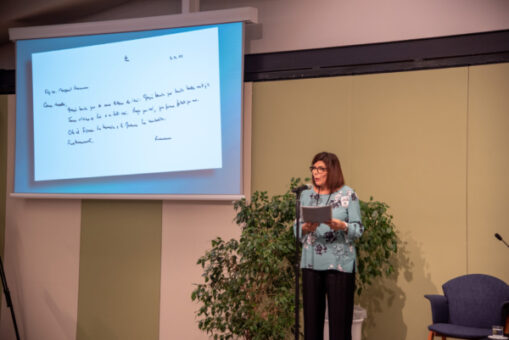
Sep 10, 2022 | Non categorizzato
In addition to the joy of being together again in person after the pandemic, an unexpected and affectionate greeting from Pope Francis has arrived to those with overall responsibility for the Focolare Movement around the world, who are meeting from 10th to 23rd September.  “I am grateful for so much good news. I am close to you personally, and to all of you. I assure you of my prayers, please pray for me too.” These were the Pope’s words in reply to a letter from Margaret Karram, President of the Focolare Movement, with which she chose to open the meeting of those responsible for the Focolare Movement in the world, together with its General Council. The President told the 104 people at the meeting that a few days ago she had felt urged to write to the Pope, to thank him for his constant closeness to her and to the Movement, hoping to give him joy. In her letter dated 6th September, among other things, she told the Pope: ‘A year and seven months have passed since I was elected President, and I confide in you that it has been a very demanding time with many challenges to be faced and many decisions to be made. I have understood more and more your words referring to the ‘pruning’ which is necessary for growth and, as I renewed my choice to embrace Jesus crucified and forsaken in this pruning, I perceived that I became more humble, I felt greater hope, and that my unity with you, Your Holiness, was ever stronger, together with the certainty that God is at work. At the same time, I witnessed a great fruitfulness and, in individuals and communities, I witnessed steps in spiritual growth being taken. I also saw greater care for the ‘least,’ and many tangible actions to help those who suffer the most’. Margaret concluded by assuring the Pope of the prayers of everyone in the Movement. She was very surprised when the following day she received this handwritten reply from Pope Francis:
“I am grateful for so much good news. I am close to you personally, and to all of you. I assure you of my prayers, please pray for me too.” These were the Pope’s words in reply to a letter from Margaret Karram, President of the Focolare Movement, with which she chose to open the meeting of those responsible for the Focolare Movement in the world, together with its General Council. The President told the 104 people at the meeting that a few days ago she had felt urged to write to the Pope, to thank him for his constant closeness to her and to the Movement, hoping to give him joy. In her letter dated 6th September, among other things, she told the Pope: ‘A year and seven months have passed since I was elected President, and I confide in you that it has been a very demanding time with many challenges to be faced and many decisions to be made. I have understood more and more your words referring to the ‘pruning’ which is necessary for growth and, as I renewed my choice to embrace Jesus crucified and forsaken in this pruning, I perceived that I became more humble, I felt greater hope, and that my unity with you, Your Holiness, was ever stronger, together with the certainty that God is at work. At the same time, I witnessed a great fruitfulness and, in individuals and communities, I witnessed steps in spiritual growth being taken. I also saw greater care for the ‘least,’ and many tangible actions to help those who suffer the most’. Margaret concluded by assuring the Pope of the prayers of everyone in the Movement. She was very surprised when the following day she received this handwritten reply from Pope Francis:
7.9.22
Ms Margaret Karram My dear sister, Thank you very much for your letter to me yesterday. I am grateful for so much good news. I am close to you personally, and to all of you. I assure you of my prayers, please pray for me too. May the Lord bless you and may Mary protect you. Fraternally, Francis 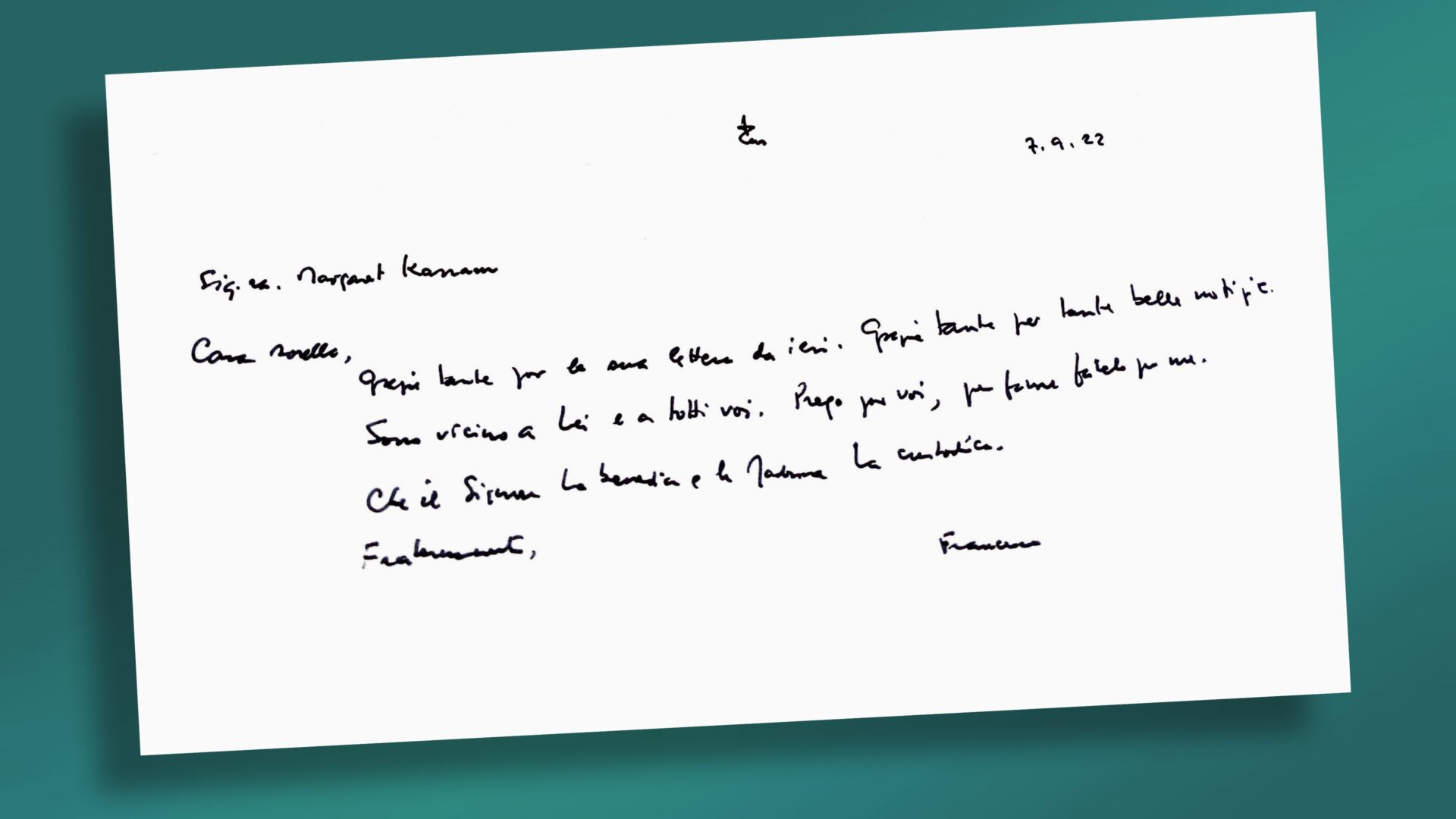
Sep 5, 2022 | Non categorizzato
On 2 June 2000, the first conference on ‘Communication and Unity’ was held, in which Chiara Lubich presented to those attending, the model of the ‘great communicator’: Jesus in the moment of his forsakenness, the mediator between humanity and God. She then listed the guiding principles of communications inspired by the charism of unity. It is unthinkable that a new communication be imposed from above, by some international agency or institution. It will come rather from the experience of communicators who have God-Love as a model for communication and as a paradigm for professional relations. Guiding principles of our communication—And indeed it is God-Love that those of us who are involved in communication seek to draw upon. They have developed out of their daily experience an original way of communicating. We present it here as a small contribution to the body of research being developed today. The first thought: for them communication is essential. The effort to live the gospel in everyday life, the experience of the Word of Life, has always been indissolubly united with communicating it, describing the various steps and the results, since it is a law that we love others as ourselves. They believe that what is not communicated is lost. So life generates light, both for those who speak and for those who listen, and it seems the experience is fixed in eternity. They have almost a vocation for communication. The second thought: to communicate, we feel the need “to make ourselves one” as we say, with the one who is listening A third thought: emphasize the positive. It has always been our way to put what is good into light, out of a conviction that it is infinitely more constructive to point out what is good, dwelling on the good and positive aspects, than to stop at the negative, even though whoever is in a position of responsibility has the duty at the proper moment to point out errors, shortcomings and failures. Finally: the person matters, not the media, which are merely an instrument. Bringing about unity first of all requires the indispensable means, which is the person, St. Paul’s new self, who has welcomed the mandate of Christ to be leaven, salt, light of the world.
Chiara Lubich
(Chiara Lubich, Essential Writings, New City Press, New York, and New City London 2007 p. 295-296)
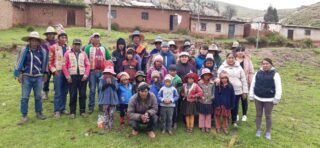
Sep 1, 2022 | Non categorizzato
As part of the programme of activities for United World Week 2022, the preparation team from Cochabamba (Bolivia), in coordination with the ‘Casa de los Niños’ in the same city, organised a visit to the rural community of Carpani 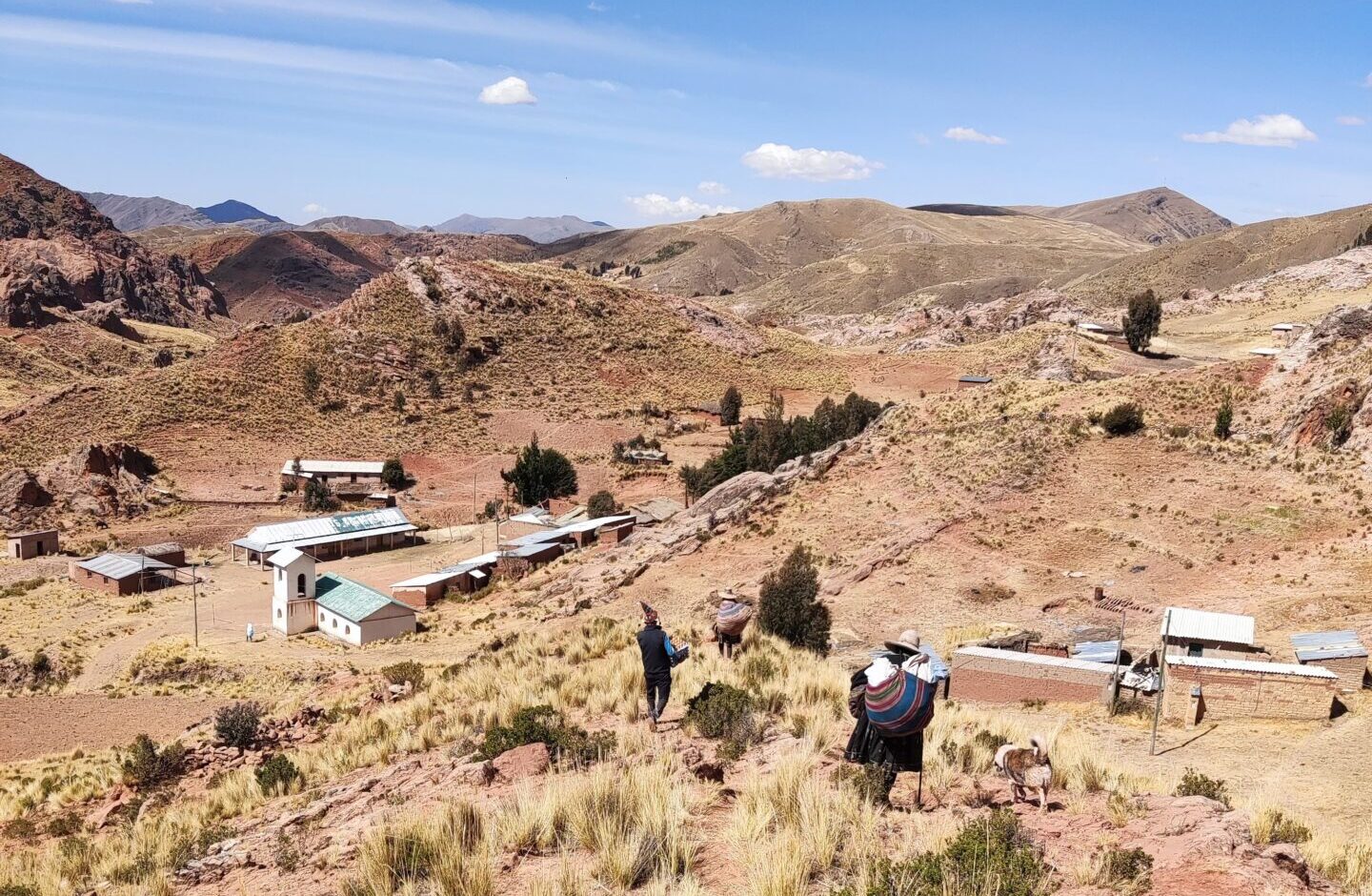 Carpani is a small town of 250 inhabitants, located in the Bolivian highlands (3,900 metres above sea level), between the departments of Cochabamba and Oruro. The invitation to visit the village was addressed to young people in particular but also to anyone else who was interested in joining. To get to the small town of Carpani (135 km from Cochabamba), we travelled for three hours on a mostly tarmaced road along an uphill mountain path. We then continued on a dirt track for about 15 km, and finally we followed a minor diversion, on a small road, to reach the village of brick and adobe clay houses nestled in the mountains. “The preparatory phase of the trip involved getting various goods, such as food and school materials for the small school which has just one multi-grade class,” says Aristide, head of the ‘Casa de los Niños’ (www.lacasadelosninos.it). Unfortunately, it has been neglected by local and national authorities who even withdrew the teacher’s salary but it has been receiving support from the ‘Casa de los Niños’ for many years – which also takes its inspiration from the charism of Unity – which tries to meet some of the many needs of the small population, sustained by a meagre production of potatoes and by grazing its small flocks of sheep.” Thanks to the support of the Focolare Movement community in Cochabamba, it has been possible to meet a large part of the needs that the Carpani community leader had told them about in advance.
Carpani is a small town of 250 inhabitants, located in the Bolivian highlands (3,900 metres above sea level), between the departments of Cochabamba and Oruro. The invitation to visit the village was addressed to young people in particular but also to anyone else who was interested in joining. To get to the small town of Carpani (135 km from Cochabamba), we travelled for three hours on a mostly tarmaced road along an uphill mountain path. We then continued on a dirt track for about 15 km, and finally we followed a minor diversion, on a small road, to reach the village of brick and adobe clay houses nestled in the mountains. “The preparatory phase of the trip involved getting various goods, such as food and school materials for the small school which has just one multi-grade class,” says Aristide, head of the ‘Casa de los Niños’ (www.lacasadelosninos.it). Unfortunately, it has been neglected by local and national authorities who even withdrew the teacher’s salary but it has been receiving support from the ‘Casa de los Niños’ for many years – which also takes its inspiration from the charism of Unity – which tries to meet some of the many needs of the small population, sustained by a meagre production of potatoes and by grazing its small flocks of sheep.” Thanks to the support of the Focolare Movement community in Cochabamba, it has been possible to meet a large part of the needs that the Carpani community leader had told them about in advance. 
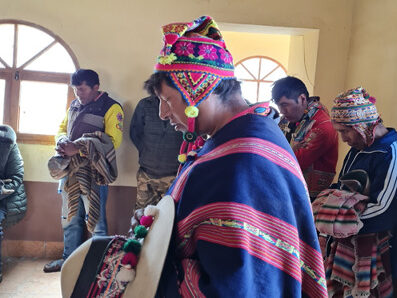 “The programme prepared for the day of the visit,” continued Silvana Verdún, “was very simple: community prayer in the small chapel, in the region’s native language of Quechua, although everyone also understands and speaks Spanish, followed by a moment of dialogue with the villagers, divided into groups of men, women and children.” “It was an experience of great mutual giving, and we all felt like brothers and sisters listening to each other and supporting each other, in the same simplicity and human warmth that characterises these people, as pure of heart as the sky and as untouched as the mountains that surround them,” said Franc Moura.
“The programme prepared for the day of the visit,” continued Silvana Verdún, “was very simple: community prayer in the small chapel, in the region’s native language of Quechua, although everyone also understands and speaks Spanish, followed by a moment of dialogue with the villagers, divided into groups of men, women and children.” “It was an experience of great mutual giving, and we all felt like brothers and sisters listening to each other and supporting each other, in the same simplicity and human warmth that characterises these people, as pure of heart as the sky and as untouched as the mountains that surround them,” said Franc Moura.  The finishing touch to the community meeting was unmissable – the moment for sharing an outdoor lunch. We prepared a communal table with all the dishes that each participant had brought, and they offered us the fruit of their labour: “potatoes a la wathia”. This is a cooking technique typically found in rural communities, which consists of digging a hole in the ground, the depth of which depends on the amount of food to be cooked; the cavity and the boulders extracted are heated with embers of firewood and charcoal. Once the right temperature is reached, the food is placed inside the hole and covered by the hot clods for a certain amount of time. These were beautiful moments that are etched in our hearts. A family from Cochabamba, on their first trip to Carpani, wrote: “We had an unforgettable experience as a family. When we returned home we sat down to talk about it and the conclusion we drew was one of absolute happiness. We were very happy to meet all of you volunteers and the community of Carpani. It was a real blessing and we would like to continue participating in other activities. Thank you for the opportunity”. The ‘united world’ also advances in little Carpani!
The finishing touch to the community meeting was unmissable – the moment for sharing an outdoor lunch. We prepared a communal table with all the dishes that each participant had brought, and they offered us the fruit of their labour: “potatoes a la wathia”. This is a cooking technique typically found in rural communities, which consists of digging a hole in the ground, the depth of which depends on the amount of food to be cooked; the cavity and the boulders extracted are heated with embers of firewood and charcoal. Once the right temperature is reached, the food is placed inside the hole and covered by the hot clods for a certain amount of time. These were beautiful moments that are etched in our hearts. A family from Cochabamba, on their first trip to Carpani, wrote: “We had an unforgettable experience as a family. When we returned home we sat down to talk about it and the conclusion we drew was one of absolute happiness. We were very happy to meet all of you volunteers and the community of Carpani. It was a real blessing and we would like to continue participating in other activities. Thank you for the opportunity”. The ‘united world’ also advances in little Carpani!
By Orlando José Zurita Vilte – Bolivia (from Ciudad Nueva Interamericana) Foto: © Franc Moura


 The megalopolis of Karachi, one of the places where the Focolare Movement has been present for some time, has not been hit as hard as other centres such as the provinces of Sindh, southern Punjab and Balucistan which even under normal conditions are already difficult to reach. However, “the displaced people are also coming here and we are mobilising to organise help in the reception camps,” said some members of the Focolare. In addition, many Focolare members of various ages and vocations are doing all they can to respond as a community to the most pressing needs, with some people even opening the doors of their homes, if necessary, as did Abid, a young father of a family, who took in sixteen Muslims who had lost everything on the first floor of his house. The largest city affected by the flood is Hyderabad. Matthew, a Gen, one of the young people of the local Focolare Movement, wrote: “The city centre is now safe, but the neighbourhoods near the Indus river are still in danger and some parts have been evacuated. The next two weeks will be very difficult.”
The megalopolis of Karachi, one of the places where the Focolare Movement has been present for some time, has not been hit as hard as other centres such as the provinces of Sindh, southern Punjab and Balucistan which even under normal conditions are already difficult to reach. However, “the displaced people are also coming here and we are mobilising to organise help in the reception camps,” said some members of the Focolare. In addition, many Focolare members of various ages and vocations are doing all they can to respond as a community to the most pressing needs, with some people even opening the doors of their homes, if necessary, as did Abid, a young father of a family, who took in sixteen Muslims who had lost everything on the first floor of his house. The largest city affected by the flood is Hyderabad. Matthew, a Gen, one of the young people of the local Focolare Movement, wrote: “The city centre is now safe, but the neighbourhoods near the Indus river are still in danger and some parts have been evacuated. The next two weeks will be very difficult.”


 Carpani is a small town of 250 inhabitants, located in the Bolivian highlands (3,900 metres above sea level), between the departments of Cochabamba and Oruro. The invitation to visit the village was addressed to young people in particular but also to anyone else who was interested in joining. To get to the small town of Carpani (135 km from Cochabamba), we travelled for three hours on a mostly tarmaced road along an uphill mountain path. We then continued on a dirt track for about 15 km, and finally we followed a minor diversion, on a small road, to reach the village of brick and adobe clay houses nestled in the mountains. “The preparatory phase of the trip involved getting various goods, such as food and school materials for the small school which has just one multi-grade class,” says Aristide, head of the ‘Casa de los Niños’ (www.lacasadelosninos.it). Unfortunately, it has been neglected by local and national authorities who even withdrew the teacher’s salary but it has been receiving support from the ‘Casa de los Niños’ for many years – which also takes its inspiration from the charism of Unity – which tries to meet some of the many needs of the small population, sustained by a meagre production of potatoes and by grazing its small flocks of sheep.” Thanks to the support of the Focolare Movement community in Cochabamba, it has been possible to meet a large part of the needs that the Carpani community leader had told them about in advance.
Carpani is a small town of 250 inhabitants, located in the Bolivian highlands (3,900 metres above sea level), between the departments of Cochabamba and Oruro. The invitation to visit the village was addressed to young people in particular but also to anyone else who was interested in joining. To get to the small town of Carpani (135 km from Cochabamba), we travelled for three hours on a mostly tarmaced road along an uphill mountain path. We then continued on a dirt track for about 15 km, and finally we followed a minor diversion, on a small road, to reach the village of brick and adobe clay houses nestled in the mountains. “The preparatory phase of the trip involved getting various goods, such as food and school materials for the small school which has just one multi-grade class,” says Aristide, head of the ‘Casa de los Niños’ (www.lacasadelosninos.it). Unfortunately, it has been neglected by local and national authorities who even withdrew the teacher’s salary but it has been receiving support from the ‘Casa de los Niños’ for many years – which also takes its inspiration from the charism of Unity – which tries to meet some of the many needs of the small population, sustained by a meagre production of potatoes and by grazing its small flocks of sheep.” Thanks to the support of the Focolare Movement community in Cochabamba, it has been possible to meet a large part of the needs that the Carpani community leader had told them about in advance. 
 “The programme prepared for the day of the visit,” continued Silvana Verdún, “was very simple: community prayer in the small chapel, in the region’s native language of Quechua, although everyone also understands and speaks Spanish, followed by a moment of dialogue with the villagers, divided into groups of men, women and children.” “It was an experience of great mutual giving, and we all felt like brothers and sisters listening to each other and supporting each other, in the same simplicity and human warmth that characterises these people, as pure of heart as the sky and as untouched as the mountains that surround them,” said Franc Moura.
“The programme prepared for the day of the visit,” continued Silvana Verdún, “was very simple: community prayer in the small chapel, in the region’s native language of Quechua, although everyone also understands and speaks Spanish, followed by a moment of dialogue with the villagers, divided into groups of men, women and children.” “It was an experience of great mutual giving, and we all felt like brothers and sisters listening to each other and supporting each other, in the same simplicity and human warmth that characterises these people, as pure of heart as the sky and as untouched as the mountains that surround them,” said Franc Moura.